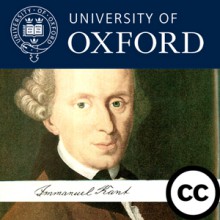
A lecture series examining Kant's Critique of Pure Reason. This series looks at German Philosopher Immanuel Kant's seminal philosophical work 'The Critique of Pure Reason'. The lectures aim to outline and discuss some of the key philosophical issues raised in the book and to offer students and individuals thought provoking Kantian ideas surrounding metaphysics. Each lecture looks at particular questions raised in the work such as how do we know what we know and how do we find out about the world, dissects these questions with reference to Kant's work and discusses the broader philosophical implications. Anyone with an interest in Kant and philosophy will find these lectures thought provoking but accessible.
| # | Episode Title | Description | People | Date | |
|---|---|---|---|---|---|
| 8 | Creative Commons | Just what is Kant's "project"? | Lecture 1/8. Both sense and reason are limited. Kant must identify the proper mission and domain of each, as well as the manner in which their separate functions come to be integrated in what is finally the inter-subjectively settled knowledge of science. | Dan Robinson | 16 Mar 2011 |
| 7 | Creative Commons | The broader philosophical context | Lecture 2/8. The significant advances in physics in the 17th century stood in vivid contrast to the stagnation of traditional metaphysics, but why should metaphysics be conceived as a "science" in the first place? | Dan Robinson | 16 Mar 2011 |
| 6 | Creative Commons | Space, time and the "Analogies of Experiences" | Lecture 3/8. Kant's so-called "Copernican" revolution in metaphysics begins with the recognition of the observer's contribution to the observation. | Dan Robinson | 16 Mar 2011 |
| 5 | Creative Commons | How are a priori synthetic judgements possible? | Lecture 4/8. Kant claims that, "our sense representation is not a representation of things in themselves, but of the way in which they appear to us. | Dan Robinson | 16 Mar 2011 |
| 4 | Creative Commons | Idealisms and their refutations | Lecture 5/8. The very possibility of self-awareness (an "inner sense" with content) requires an awareness of an external world by way of "outer sense". Only through awareness of stable elements in the external world is self-consciousness possible. | Dan Robinson | 16 Mar 2011 |
| 3 | Creative Commons | Concepts, judgement and the Transcendental Deduction of the Categories | Lecture 6/8. Empiricists have no explanation for how we move from "mere forms of thought" to objective concepts. The conditions necessary for the knowledge of an object require a priori categories as the enabling conditions of all human understanding. | Dan Robinson | 16 Mar 2011 |
| 2 | Creative Commons | The "Self" and the Synthetic Unity of Apperception | Lecture 7/8. Kant argues that: "The synthetic unity of consciousness is... an objective condition of all knowledge. | Dan Robinson | 16 Mar 2011 |
| 1 | Creative Commons | The discipline of reason: The paralogisms and Antinomies of Pure Reason. | Lecture 8/8. Reason, properly disciplined, draws permissible inferences from the resulting concepts of the understanding. The outcome is knowledge. | Dan Robinson | 16 Mar 2011 |
